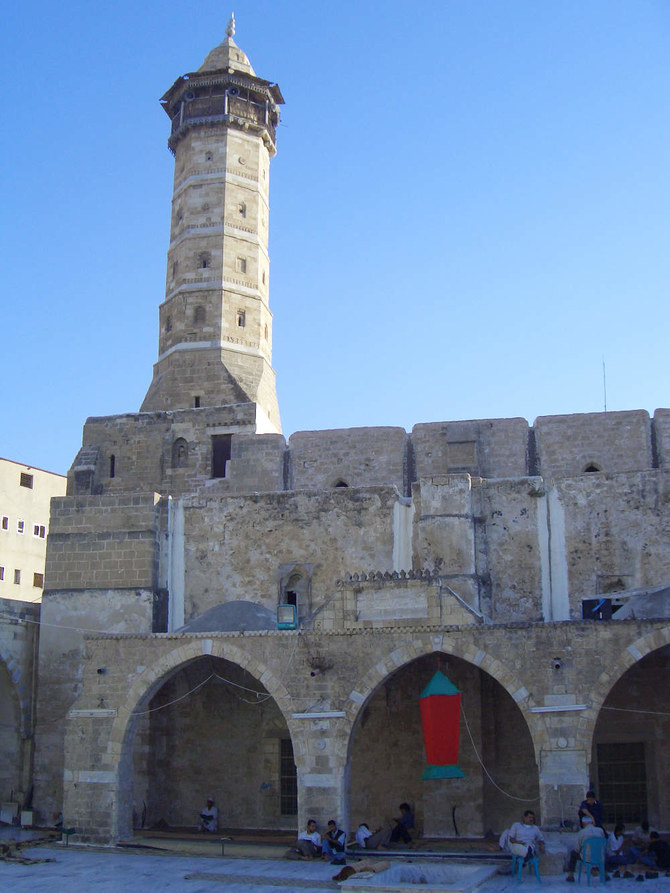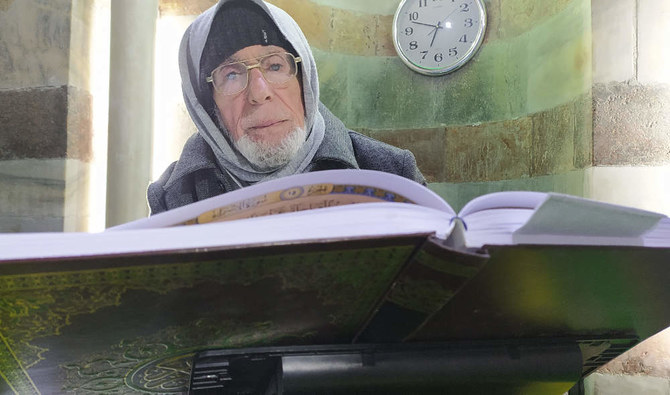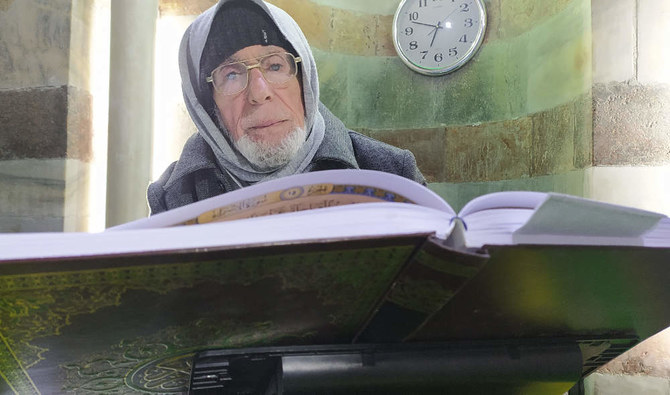GAZA CITY: The name of the Palestinian Abu Husam Haniyeh has been associated with the muezzin of the Great Omari Mosque in Gaza City, the second oldest mosque in Palestine after Al-Aqsa Mosque in Jerusalem, for half a century.
Haniyeh, 85, began his journey with the call to prayer as a volunteer. Now he is the oldest muezzin in the Gaza Strip, according to data from the Ministry of Waqfs and Religious Affairs.
“When I started as a muezzin, I did not expect that my life would extend for all these years and my name would become associated with this great ancient mosque,” he said.

The Great Omari Mosque is the second oldest mosque in historical Palestine after the Al-Aqsa Mosque. (Supplied)
Haniyeh recalls, many decades ago, the first time he took to the microphone at the Omari Mosque and shouted the call to prayer, after he sought permission from the former authorized muezzin.
“It was a wonderful experience that I will never forget, and after the death of Abu Al-Said I succeeded him as the authorized muezzin.”
Haniyeh remained a volunteer, raising the call to prayer for the five daily prayers, until the establishment of the Palestinian Authority in 1994, and his reliance on the records of muezzins in the Ministry of Waqfs, for about $155.
“I do not look for the reward of this life, for the reward of the muezzin is with God and his reward is great on the Day of Resurrection . . . We are the muezzins, the voice of God on earth, we call people to worship and leave the pleasures of this life,” he said.
The muezzin stays at the Omari Mosque, which is adjacent to his house in the ancient neighborhood of Al-Daraj in old Gaza, all hours of the day, and he does not leave except for limited times that he spends with his family.
He finds comfort inside the mosque, especially during the month of Ramadan, where he reads the Qur’an and exchanges conversations with others of his generation, recalling memories of the past.
Haniyeh comes from a refugee family who was forced to leave Jaffa during the Nakba in 1948.
He did not return to school after the Nakba, and his family sought refuge in Gaza City. Haniyeh later worked as a carpenter, was married and had three sons and three daughters.
“I wish to return to Jaffa, and to raise the call to prayer in the blessed Al-Aqsa Mosque,” he said.
“I remember everything from the days when I was in Jaffa, the house we used to live in, my father’s journey by train to Egypt and from there to Saudi Arabia to perform the Hajj, the iftar cannon, and the many friends we used to have. We had fun and played together in alleys and on the beach,” he said.
Haniyeh’s association with the Omari Mosque over many decades has made him an expert on the history of the mosque. It is the second oldest mosque in historical Palestine after the Al-Aqsa Mosque, and the third in size after Al-Aqsa and Ahmed Pasha Al-Jazzar Mosque in the city of Acre.
The mosque can accommodate about 5,000 worshipers, reaching a peak in Ramadan, especially during the last ten nights of this month.
The area of the Omari Mosque is 4,100 square meters. The first building erected on this site, as a pagan temple, dates back about 3,700 years. It remained so until the Romans established the “Porphyrios Church” on its ruins after their occupation of the Levant in 407 AD.
The church remained in existence until the Islamic conquest of Gaza in 634 AD, when the majority of Gazans converted to Islam, except for a few who remained Christian. It was agreed between the residents to build a mosque on the larger area of the site, and a church for the Christian minority on a smaller area that still exists today and bears the same name as Saint Porphyrios Orthodox Church.
























